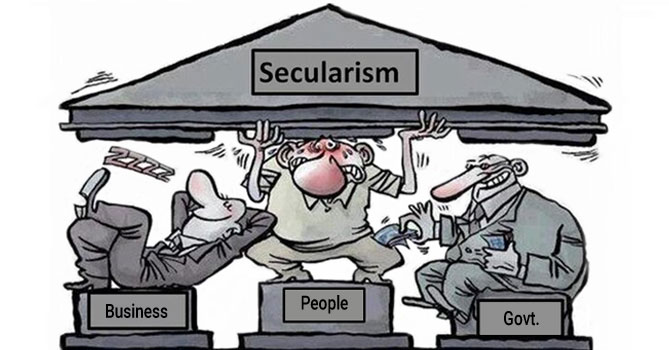Secularism is a belief in keeping religion separate from the social, political, economic and cultural spheres of life. Here, the word “Secular” refers to being “separate” from religion or having no religious basis. The term ‘secularism’ is similar to the Vedic concept of ‘Dharma nirapekshata’, which is the state’s indifference to religion. Religion is a purely personal choice for every individual with no different treatment to them. It focuses on the non-cohesion of the state from religion and absolute freedom to all religions and tolerance of all religions. It also means equal opportunities for practitioners of all religions and without any prejudices and biased acts on the grounds of religion towards them.
The term ‘Secular’ is mentioned in the Preamble of India by the 42nd Amendment Act, 1976. Indian Secularism is present in its fundamental rights from Article 25 to Article 28, where it ensures each of its citizens the right to practice any religion.
Example of Secularism: Indians celebrate all festivals with their absolute freedom to celebrate any religion in the country irrespective of their caste and creed.
“The State does not owe loyalty to any particular religion as such: it is not irreligious or anti-religious; it gives equal freedom to all religions,” PB Gajendragadkar, a former Chief Justice of India, stated the definition of Secularism.
Indian philosophy of Secularism is associated with “Sarva Dharma Sambhava” (destination of the ways followed by all religions is the same, though the ways themselves may be different), which implies equal reverence and dignity to all religions.
This approach, backed and motivated by renowned people like Vivekananda and Mahatma Gandhi, is called ‘Positive secularism’ that shows the dominant ethos of the Indian culture.
Important articles (included in the Indian Constitution) related to Secularism
- Article 14: It provides equality before the law and equal protection of the laws to everyone.
- Article 15: It guarantees a broader view of the concept of Secularism to the maximum possible reach by banning discrimination on the grounds of religion, caste, race, sex or place of birth.
- Article 16 (1): It provides equality of opportunity to all citizens when it comes to public employment and reemphasise that there would be no discrimination based on religion, caste, race, sex, descent, place of birth and residence.
- Article 25: It gives ‘Freedom of Conscience’, which means all persons are equally entitled to freedom of conscience and the right to profess, practise and propagate religion freely.
- Article 26: Every religious group or individual has the right to constitute and regulate centres for religious and charitable work and handle its affairs in matters of religion.
- Article 27: The state shall not direct any citizen to pay any taxes to promote and improvise any specific religion or religious centre.
- Article 28: It permits educational institutions coordinated by different religious groups to give religious instructions.
- Article 29 and Article 30: They guarantee cultural and educational rights to the minorities or their groups.
- Article 51A: Fundamental Duties make all citizens promote unity and the spirit of common brotherhood and value and preserve the rich heritage of composite culture.
Threats to Secularism
- Connecting Religion and Politics in any form, which mobilises voters on various grounds of primordial recognition such as caste, religion and ethnicity, leading Indian Secularism in perils.
- Communal politics runs through communalise plan of diversification, social space, by propagating myths and stereotypes against minorities, through an attack on rational values by performing polarised ideological propaganda and politics, enabling riots in particular parts of the country.
- Politicisation of any religious group triggers the competitive divide of other groups, which have inter-religious disputes.




